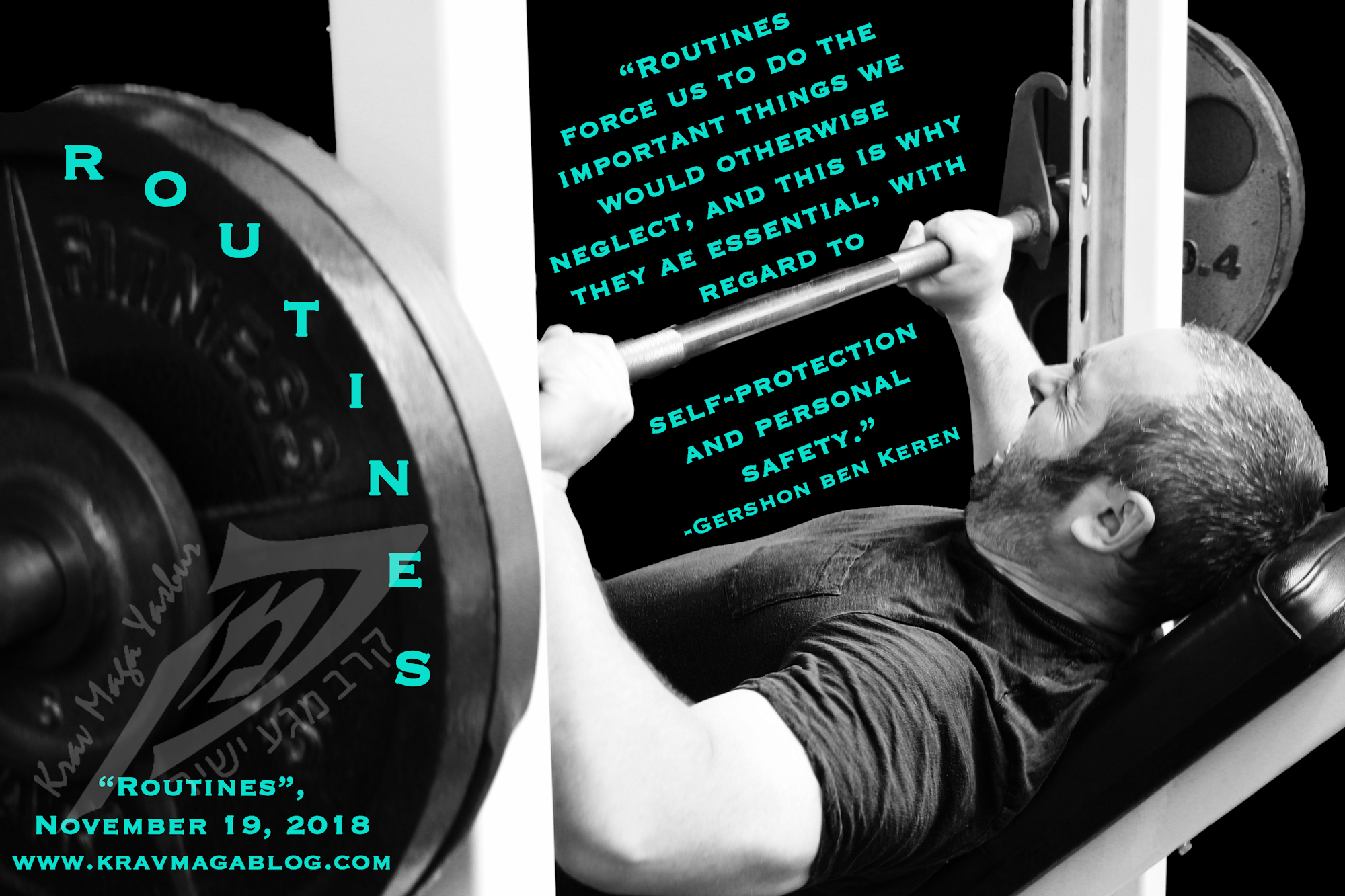Author: Gershon Ben Keren

One of the things I talk about regularly when discussing self-protection and personal safety is the importance of routines and habits i.e. developing routines that become second nature and are performed without thinking; in the beginning, such routines have to be actively adhered to, however this takes mental bandwidth, and so where possible it’s better to have them as things which run automatically in the background, and engage with our conscious mind at appropriate points e.g. I have a routine I run through when entering/exiting my car and my house – which have different actions depending on time of day, etc. — some of the points which I perform, I do without thinking, and others require me to consciously and actively engage with my environment; and before people begin to question my levels of paranoia, I’m not using an inspection mirror to check under my car, or any of the things that I might do in a professional capacity – my routines, reflect my lifestyle, and are used to mitigate the potential risks in it; and these may be subject to change as/if my lifestyle changes e.g. I move to a different country or locale, where different threats are prevalent, such as carjackings and home invasions, etc. Your routines, too, should be in line with and reflect your risk assessments (which I have written about before).
Perhaps the hardest part about having such routines is sticking to them, and not making exceptions. A pilot will run through the same checklist before every flight, not making assumptions and missing out steps, because they are in a hurry, or believe that something doesn’t need to be checked, in a given instance. Anyone who has lived and/or worked in a hostile environment will be aware of the dangers of slipping up – a friend of mine, working in the Middle East, was involved in a road-side ambush, due to the individual leading the team being lax in changing the routes they were taking — because things were quiet, and nothing had happened for awhile. For most of us, most of the time, nothing does/will happen, however adhering to our routines, reduces the likelihood of having to engage with any threats that may be present, and if this is unavoidable, we will be in better mindset to deal with them, etc. Developing routines makes us think about our safety, and this alone puts us in a better position to deal with violence. Our routines, should also include our potential responses to threats, such as having a safe place to go in the event of an emergency e.g. if your house/apartment became compromised and you needed to quickly leave it, do you know where you would immediately go? If you have such a plan and somewhere/someone to head to, you are much more likely to leave when it is warranted, than stay.
Routines need to be periodically reviewed and potentially updated, in order for them to remain relevant, consider, and account for new threats and dangers. As those who want to gain access to us change their methods of doing so, we may need to adapt our routines in order to counter them. Sometimes, we may periodically have to develop routines to deal with specific threats and phenomena e.g. in 2002, the “Beltway Sniper Attacks” saw two shooters – John Allen Muhammad and Lee Boyd Malvo – target customers at gas stations filling up their cars; many people in the Baltimore-Washington Metropolitan Area, at the time, changed and adjusted their existing routines regarding what had been before a largely mundane and safe activity, in order to mitigate this very specific threat. However, on the whole our routines should be general, rather than specific, so instead of having many different routines, for many different situations, we have a few that deal with the majority of potential incidents and events e.g. my routine for getting in and out of my car (embus - debus) deals with people who may want to engage with me as I do so, regardless of their motivation(s) and intent towards me. I don’t have individual and specific routines, that I vary between, as putting such variations into play, can put me at risk if I misjudge a situation; my general routine/method suffices.
Routines also stop us from panicking and rushing things. This doesn’t mean steps and stages don’t have to be enacted quickly, but each needs to be completed, in order e.g. when I’m dealing with unknown individuals, I step back controlling range, bring my right foot back, move offline, and bring my hands up etc. This doesn’t mean I’m assuming a De-escalation/Interview stance, as there are an infinite number of ways to position my hands in an unassuming and natural manner – I just want them up, in that initial moment. Context drives this action/response e.g. an unknown person who is at a private social function, is not the same as an unknown person at a public social function, etc., and so this routine is only applied where appropriate. I know there are some individuals out there who see themselves as Jason Bourne characters, where everybody is a potential danger who is out to get them and must be treated with the utmost suspicion, however such hyper-vigilance in most situations is completely unnecessary, and usually counter-productive where personal safety is concerned.
Routines are what ground us, and prevent us, from turning small things into insurmountable ones. This is true in all aspects of life, not just personal safety. A lot of mental health issues, such as depression and dementia, can be aided by routine. Improving our levels of fitness, will only occur if we follow some sort of routine. Routines force us to do the important things we would otherwise neglect, and this is why they ae essential, with regard to self-protection and personal safety.